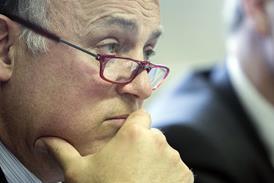A rush of acute hospital mergers have been announced in the wake of the Department of Health deadline for submitting plans to become a foundation trust.
In the past week Winchester and Eastleigh Healthcare and Trafford Healthcare have joined three other acute trusts in looking at plans to be taken over by an existing foundation trust or merged to create a new organisation more likely to survive the authorisation process (see below).
The announcements are in response to the 30 November deadline set by the DH for NHS trusts to detail their plans to become a foundation by April 2014. The process has provoked some scepticism over how realistic some proposals are.
Eight acute trusts that had no date for completing the Monitor authorisation process in August this year have told the DH they will work to meet what is becoming known as the “drop dead” deadline of April 2014. They include the Princess Alexandra and Mid Essex trusts in the East of England.
The strategic health authority’s director of strategy Stephen Dunn told HSJ there was “no reason why either organisation shouldn’t be an FT in their own right”.
“We are working through the realism of that. We are going to reset the timelines over the next couple of years and if they fall off the trajectory then we will consider merger and acquisition,” he said.
Several trusts in the foundation pipeline face considerable financial difficulties.
Only one of the six hospital trusts listed as financially challenged by the DH in June - Trafford - has announced a new plan for its future.
The other five listed, four of which are in London, claim they can achieve foundation status.
A source close to the process of overseeing struggling acute trusts told HSJ: “Everyone knows the SHAs have got their arranged marriages up their sleeves. It’s just whether they get to do them or not. The [November deadline] put more pressure on, but if you’re under pressure to give a date you just give a date.”
A new special health authority is expected to take over responsibility for organisations deemed unable to achieve foundation status.
Salisbury chief executive Matthew Kershaw has been seconded to the DH as director of provider delivery, and may run the new authority.
It is thought the authority will also hold the contract for Hinchingbrooke Health Care Trust if, as planned, it is handed to Circle to run for 10 years.
The merger and takeover announcements are part of a general shift towards consolidation among NHS providers.
According to the latest PCT plans, the end of the transforming community services programme in April will see 55 per cent of primary care trust provider arms being taken over by mental health or hospital trusts.
A further 26 per cent plan to become community foundation trusts, but many of those plans involve provider arms merging across PCT boundaries.
At least two SHAs - North West and Yorkshire and the Humber - are encouraging provider trusts to form closely linked “healthcare groups” as an alternative to full mergers or acquisitions.
The groups are being planned across acute, mental health and community providers, sharing functions ranging from back office tasks to pathology. The finance director at one provider told HSJ the real value would lie in agreeing regional “carve-ups” between providers as to who got which referrals.
One example being developed is between Huddersfield and Calderdale Foundation Trust and East Lancashire Hospitals Trust, which are planning to adopt a governance model for their group early next year. It will span the Yorkshire and Lancashire border and two SHAs.
East Lancashire Hospitals Trust also plans to apply to become a foundation trust.
Diane Whittingham, chief executive of both trusts, said the healthcare group would first look at savings in back office administration and procurement, and clinical support like pharmacy and pathology, and later at changes to clinical services.
Ms Whittingham said forming the group would increase financial stability for both organisations without compromising their governance. “This is a difficult time for providers and working in a group model is going to be part of the solution. I see it as integral to ensuring my organisations’ future.”
NHS North West chief executive Mike Farrar said: “As money gets tighter this is a way of getting efficiencies [and] avoiding duplication and creating more resilience for your services.”
South West Yorkshire Partnership Foundation Trust chief executive Steven Michael, also lead for provider reform in the region, said: “Traditional merger and acquisition takes an awful lot of time, an awful lot of money and often doesn’t produce results. It can be too fundamental in its change.”
Where are they now?
The 16 acute trusts with no Monitor application date in August:
- Winchester and Eastleigh Healthcare Trust planned takeover by Basingstoke and North Hampshire Foundation Trust
- Trafford Healthcare Trust talking to local foundation trusts about potential takeover
- Nuffield Orthopaedic Centre Trust planned merger with Oxford Radcliffe Hospitals Trust
- Scarborough and North East Yorkshire Healthcare Trust planned takeover by York Teaching Hospital Foundation Trust
- Weston Area Health Trust HSJ understands the trust is in talks about takeover by a local FT
- Hinchingbrooke Health Care Trust Circle is preferred private bidder to run the trust under a franchise
- Dartford and Gravesham Trust unknown
- St Helens and Knowsley Teaching Hospitals Trust no plan, discussing PFI with DH
Now plan to apply for FT status:
- Northern Devon Healthcare Trust
- Princess Alexandra Hospital Trust
- Mid Essex Hospital Services Trust
- Southport and Ormskirk Hospitals Trust
- Hereford Hospitals Trust
- East Lancashire Hospitals Trust
- Walsall Hospitals Trust
- East Cheshire Trust
Topics
- Acute care
- Andrew Lansley
- CALDERDALE AND HUDDERSFIELD NHS FOUNDATION TRUST
- Community services
- Department of Health and Social Care (DHSC)
- EAST LANCASHIRE HOSPITALS NHS TRUST
- East of England
- Foundation trusts
- Ian Dalton
- Mental health
- Mike Farrar
- Monitor
- North West
- North West Anglia NHS Foundation Trust
- Pharma
- Reconfiguration
- SOUTH WEST YORKSHIRE PARTNERSHIP NHS FOUNDATION TRUST
- Strategic health authorities (SHAs)
- TRAFFORD HEALTHCARE NHS TRUST
- WINCHESTER AND EASTLEIGH HEALTHCARE NHS TRUST
- Yorkshire and the Humber
Merger plans announced as FT deadline looms
- 1
 Currently reading
Currently readingMerger plans announced as FT deadline looms
- 2



























5 Readers' comments